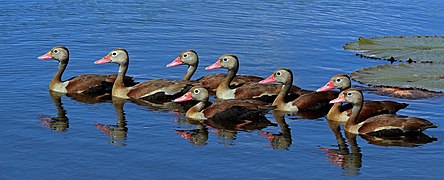Portal:Trinidad and Tobago
Trinidad and Tobago Portal
The Republic of Trinidad and Tobago is a country located at the southern tip of the Caribbean. It borders the countries of Grenada and Venezuela. It was the first Caribbean country to host the Summit of the Americas. It shares maritime boundaries with other nations including Barbados to the northeast, Guyana to the southeast, and Venezuela to the south and west. A treaty between the Republic of Trinidad and Tobago and the Republic of Venezuela on the delimitation of marine and submarine areas, 18 April 1990. The country covers an area of 5,128 square kilometres (1,980 sq mi) and consists of two eponymous main islands, Trinidad and Tobago, and numerous smaller landforms. Trinidad is the larger and more populous of the main islands; Tobago is much smaller, comprising about 6% of the total area and 4% of the entire population which is estimated at 1.3 million (2005). Unlike most of the English-speaking Caribbean, Trinidad and Tobago's economy is primarily industrial with an emphasis on petroleum and petrochemicals. Trinidad and Tobago is well known for its African and Indian cultures, reflected in its large and famous Carnival, Diwali, and Hosay celebrations, as well being the birthplace of steelpan, the limbo, and music styles such as calypso, soca, rapso, parang, chutney, and chutney soca.[1][2][3][4][5][6][7] Selected article -The history of the TT Pro League (formerly known as the Professional Football League) has its roots spanning back to the 1970s and 1980s when Trinidad and Tobago experienced an upswing in support for its domestic football. Several of the national team players featured for Defence Force during its dominance of the National League, which included the Teteron Boys becoming the first Trinidadian and only second club from CONCACAF to accomplish the continental treble in 1985. In addition, the national team also rose to prominence in the late 1980s after falling short by one match of qualification for the nation's first FIFA World Cup in 1989. Optimism for the growth and community interest of football in Trinidad and Tobago was at an all-time high. However, the early 1990s would mark a low point in Trinidad and Tobago football. In 1993, after a streak of poor performances, the Soca Warriors gave its worst ever showing in the 1993 Caribbean Cup after finishing a disappointing third, which was preceded by an early exit from its '94 for Sure campaign to qualify for the 1994 FIFA World Cup hosted in the United States. In response to the downward trend in the sport, several initiatives were implemented by the Trinidad and Tobago Football Association to repair its credibility and return confidence among the clubs and businesses to support domestic football. In 1994, the Football Association secured a four-year agreement with Umbro to sponsor the national team with equipment and apparel. This was soon followed by an announcement that local beer manufacturers Carib agreed to become the title sponsor of the National League, which included the injection of prize money for the first time in domestic football. The following year, Trinidadian and former FIFA vice-president Jack Warner proposed that the creation of a professional football league in Trinidad and Tobago was needed to strengthen its national team and improve the development of its domestic players. In order to establish a professional football league in the country, the Football Association created the Semi-Professional League in 1996 to provide teams and players a three-year period to meet admission criteria and transition to life in a professional league. (Full article...) CategoriesSelected quoteIn the news
WikiProject
General imagesThe following are images from various Trinidad and Tobago-related articles on Wikipedia. Selected picture The secluded Englishman's Bay in Tobago.
Did you know
Selected cuisine
Buljol is a salad dish of the cuisine of Trinidad and Tobago. It consists of chopped codfish, tomatoes and chilies. The name is of French origin. 18th century colonial power Spain launched the cédula de población in 1783, an edict that successfully promoted the settling of French (i.e. likewise Catholic) planters in Trinidad who quickly set the population majority. The name is a combination of the French words brulé (burnt) and gueule (muzzle), which was changed into "bu'n jaw" in Trinidad's 19th century patois and finally morphed into "buljol". The name does not relate to the temperature of the dish (it's served cold) but to its hotness, caused by the added hot pepper.
Selected panoramaQuinam Bay, Columbus Channel, South Coast, Trinidad (2008)
TopicsLists
Select [►] to view subcategories
Recognized content
Featured articlesFeatured listsGood articles
Did you know? articles
Featured pictures
Featured portalsIn the News articles
Main page featured articlesMain page featured listsPicture of the day pictures
Related portalsWikiProjectsTrinidad and Tobago Wikipedians' Notice Board · Trinidad and Tobago Wikipedians
Associated WikimediaThe following Wikimedia Foundation sister projects provide more on this subject:
Portal informationThis portal is maintained by WikiProject Trinidad and Tobago
Discover Wikipedia using portals |
||||||||||||||||||||||||||||||||||||||||||||||||||||||||||||||||||||||
- ^ "In Trinidad, Diwali Lights Up Like Christmas". NPR. Archived from the original on 17 February 2020. Retrieved 20 March 2019.
- ^ "Diwali in Trinidad and Tobago". trinidad.us. Archived from the original on 2 March 2019. Retrieved 20 March 2019.
- ^ Ingram, Amy. "What is Chutney Music?". Wesleyan University. Archived from the original on 16 July 2011. Retrieved 10 September 2018.
- ^ "Parang Music". Destination Trinidad and Tobago. Archived from the original on 10 September 2018. Retrieved 10 September 2018.
- ^ "Soca Music History". Artdrum. Archived from the original on 19 September 2018. Retrieved 10 September 2018.
- ^ "A brief history of the steel pan". BBC. 24 July 2012.
- ^ "Trinidad Carnival for Beginners". Caribbean Beat. 1 January 1993. Archived from the original on 8 April 2018. Retrieved 10 September 2018.





































































